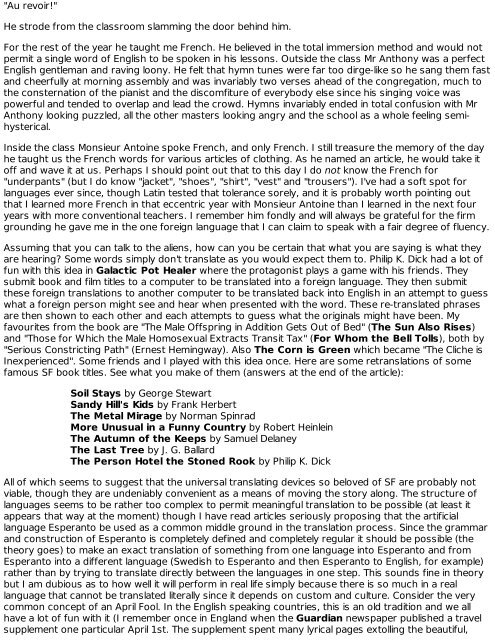Triffids Beard 2 - The Bearded Triffid
Triffids Beard 2 - The Bearded Triffid
Triffids Beard 2 - The Bearded Triffid
Create successful ePaper yourself
Turn your PDF publications into a flip-book with our unique Google optimized e-Paper software.
"Au revoir!"<br />
He strode from the classroom slamming the door behind him.<br />
For the rest of the year he taught me French. He believed in the total immersion method and would not<br />
permit a single word of English to be spoken in his lessons. Outside the class Mr Anthony was a perfect<br />
English gentleman and raving loony. He felt that hymn tunes were far too dirge-like so he sang them fast<br />
and cheerfully at morning assembly and was invariably two verses ahead of the congregation, much to<br />
the consternation of the pianist and the discomfiture of everybody else since his singing voice was<br />
powerful and tended to overlap and lead the crowd. Hymns invariably ended in total confusion with Mr<br />
Anthony looking puzzled, all the other masters looking angry and the school as a whole feeling semihysterical.<br />
Inside the class Monsieur Antoine spoke French, and only French. I still treasure the memory of the day<br />
he taught us the French words for various articles of clothing. As he named an article, he would take it<br />
off and wave it at us. Perhaps I should point out that to this day I do not know the French for<br />
"underpants" (but I do know "jacket", "shoes", "shirt", "vest" and "trousers"). I've had a soft spot for<br />
languages ever since, though Latin tested that tolerance sorely, and it is probably worth pointing out<br />
that I learned more French in that eccentric year with Monsieur Antoine than I learned in the next four<br />
years with more conventional teachers. I remember him fondly and will always be grateful for the firm<br />
grounding he gave me in the one foreign language that I can claim to speak with a fair degree of fluency.<br />
Assuming that you can talk to the aliens, how can you be certain that what you are saying is what they<br />
are hearing? Some words simply don't translate as you would expect them to. Philip K. Dick had a lot of<br />
fun with this idea in Galactic Pot Healer where the protagonist plays a game with his friends. <strong>The</strong>y<br />
submit book and film titles to a computer to be translated into a foreign language. <strong>The</strong>y then submit<br />
these foreign translations to another computer to be translated back into English in an attempt to guess<br />
what a foreign person might see and hear when presented with the word. <strong>The</strong>se re-translated phrases<br />
are then shown to each other and each attempts to guess what the originals might have been. My<br />
favourites from the book are "<strong>The</strong> Male Offspring in Addition Gets Out of Bed" (<strong>The</strong> Sun Also Rises)<br />
and "Those for Which the Male Homosexual Extracts Transit Tax" (For Whom the Bell Tolls), both by<br />
"Serious Constricting Path" (Ernest Hemingway). Also <strong>The</strong> Corn is Green which became "<strong>The</strong> Cliche is<br />
Inexperienced". Some friends and I played with this idea once. Here are some retranslations of some<br />
famous SF book titles. See what you make of them (answers at the end of the article):<br />
Soil Stays by George Stewart<br />
Sandy Hill's Kids by Frank Herbert<br />
<strong>The</strong> Metal Mirage by Norman Spinrad<br />
More Unusual in a Funny Country by Robert Heinlein<br />
<strong>The</strong> Autumn of the Keeps by Samuel Delaney<br />
<strong>The</strong> Last Tree by J. G. Ballard<br />
<strong>The</strong> Person Hotel the Stoned Rook by Philip K. Dick<br />
All of which seems to suggest that the universal translating devices so beloved of SF are probably not<br />
viable, though they are undeniably convenient as a means of moving the story along. <strong>The</strong> structure of<br />
languages seems to be rather too complex to permit meaningful translation to be possible (at least it<br />
appears that way at the moment) though I have read articles seriously proposing that the artificial<br />
language Esperanto be used as a common middle ground in the translation process. Since the grammar<br />
and construction of Esperanto is completely defined and completely regular it should be possible (the<br />
theory goes) to make an exact translation of something from one language into Esperanto and from<br />
Esperanto into a different language (Swedish to Esperanto and then Esperanto to English, for example)<br />
rather than by trying to translate directly between the languages in one step. This sounds fine in theory<br />
but I am dubious as to how well it will perform in real life simply because there is so much in a real<br />
language that cannot be translated literally since it depends on custom and culture. Consider the very<br />
common concept of an April Fool. In the English speaking countries, this is an old tradition and we all<br />
have a lot of fun with it (I remember once in England when the Guardian newspaper published a travel<br />
supplement one particular April 1st. <strong>The</strong> supplement spent many lyrical pages extolling the beautiful,


